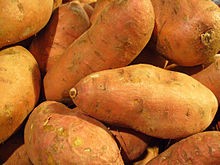
Sweet potato, not only is just sweet to your taste buds but also good for your cardiovascular health. It is an edible, underground tuber initially cultivated in the Central American region. This crunchy, starch root vegetable is rich source of flavonoid anti-oxidants, vitamins, minerals, and dietary fiber that are essential for optimal health.
Sweet potatoes are high in vitamin A, vitamin B5, B6, thiamin, niacin, riboflavin, and, due to their orange color, are high in carotenoids. they're also fat-free, relatively low in sodium and have fewer calories than white potatoes, according to livescience.com.
Sweet potatoes are one of the best sources of vitamin A; a large one contains more than 100 percent of the daily recommended intake, according to the U.S. Food and Drug Administration. Vitamin A is an antioxidant powerhouse, and is linked to anti-aging benefits, cancer prevention and the maintenance of good eyesight, according to theNational Institutes of Health, according to livescience.com.
Sweet potato is one of the high calorie starch foods. The tuber, however, contains no saturated fats or cholesterol, and is rich source of dietary fiber, anti-oxidants, vitamins, and minerals.
Its calorie content mainly comes from starch, a complex carbohydrate. Sweet potato has higher amylose to the amylopectin ratio than that in potato. Amylose raises the blood sugar levels rather slowly on comparison to simple fruit sugars and therefore, recommended as a healthy food supplement even in diabetes.
The tuber is an excellent source of flavonoid phenolic compounds such as beta-carotene and vitamin-A. 100 g tuber provides 14,187 IU of vitamin A and 8,509 µg of β-carotene, a value which is the highest for any root-vegetables categories. These compounds are powerful natural antioxidants. Vitamin A is also required by the body to maintain integrity of healthy mucus membranes and skin. It is a vital nutrient for healthy vision. Consumption of natural vegetables and fruits rich in flavonoids helps to protect from lung and oral cavity cancers.
The total antioxidant strength of raw sweet potato measured in terms of oxygen radical absorbance capacity (ORAC) is 902 µmol TE/100 g.
The tubers are packed with many essential vitamins such as pantothenic acid (vitamin B-5),pyridoxine (vitamin B-6), and thiamin (vitamin B-1), niacin, and riboflavin. These vitamins are essential in the sense that the human body requires them from external sources to replenish. These vitamins function as co-factors for various enzymes during metabolism.
Sweet potato provides a good amount of vital minerals such as iron, calcium, magnesium, manganese, and potassium that are very essential for enzyme, protein, and carbohydrate metabolism.
Sweet potato leaves are indeed more nutritious than the tuber itself. Weight per weight, 100 g of fresh leaves contain more iron, vitamin C, folates, vitamin K, and potassium but less sodium than its tuber.
Health risks
They may also cause some interesting skin-related side effects. "While there aren't any severe health problems associated with sweet potatoes, they are high in vitamin A, which the body stores," Flores said. "When levels get too high, you may notice your skin and nails looking a little orange." This side effect should decrease if you cut down on sweet potato consumption.
According to the Mayo Clinic, people with a history of kidney stones may want to avoid eating too many sweet potatoes, as the vegetable contains oxalate, which contributes to the forming of calcium-oxalate kidney stones.

